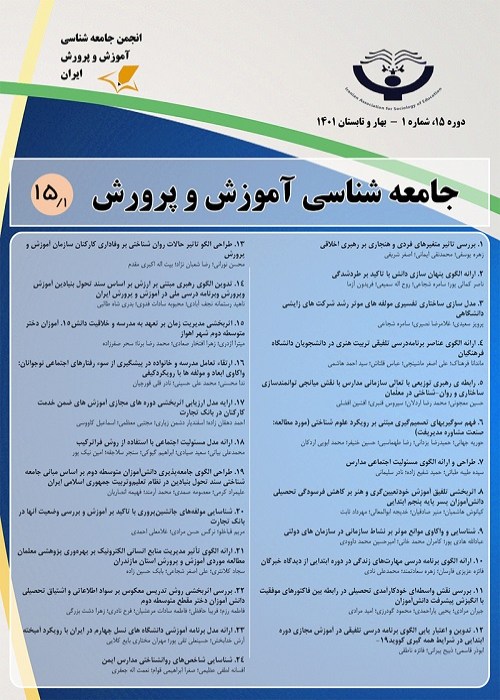Pattern of Effective Factors on Ethical Growth and Determine Their Status in Elementary Period Students
Author(s):
Article Type:
Research/Original Article (دارای رتبه معتبر)
Abstract:
Purpose
The aim of this research was investigate the pattern of effective factors on ethical growth and determine their status in elementary period students. Methodology
This study in terms of purpose was applied and in terms of implementation method was mixed (qualitative and quantitative). The study population in the qualitative section was ethical growth experts who according to the principle of theoretical saturation number of 12 people of them were selected by purposive and snowball sampling methods. The study population in the quantitative section was an elementary period students of Tehran city in the academic years of 2019-2020 who according to Cochran's formula number of 377 people of them were selected by multi-stage cluster sampling method. Data were collected by semi-structured interview and researcher-made questionnaire methods and analyzed by open, axial and selective coding and one-sample t-test methods in SPSS-21 software. Findings
The findings of the qualitative section showed that the effective factors on ethical growth had 88 concepts, 20 factors and 6 categories which categories and factors were included of living environment and upbringing (with three factors of role of family environment in ethical growth, role of educational environment in ethical growth and role of peer group in ethical growth), ethical reasoning (with three factors of cognitive reasoning, emotional reasoning and psycho-motor reasoning), supportive environment (with three factors of family and educators have scientific knowledge, use of incentives and attention to spiritual issues), psychological, social and educational injuries (with four factors of injuries due to personality and mental characteristics, injuries due to improper use of media, injuries due of family problems and injuries due of educational functions), create of cognition (with three factors of responsibility, empowerment and modeling) and ethical virtues (with four factors of altruism, human dignity, rule of law and decision-making power). The findings of the quantitative section showed that there were a significant difference between the mean of all factors with the mean of society (p < 0.05. Conclusion
According to the results of the present study, planning is necessary to improve the ethical growth of students. Therefore, specialists and planners in the field of education can design and implement programs according to the categories and factors of this research to improve the ethical growth of elementary period students.Keywords:
Language:
Persian
Published:
JOURNAL OF SOCIOLOGY OF EDUCATION, Volume:7 Issue: 1, 2021
Pages:
88 to 100
magiran.com/p2306457
دانلود و مطالعه متن این مقاله با یکی از روشهای زیر امکان پذیر است:
اشتراک شخصی
با عضویت و پرداخت آنلاین حق اشتراک یکساله به مبلغ 1,390,000ريال میتوانید 70 عنوان مطلب دانلود کنید!
اشتراک سازمانی
به کتابخانه دانشگاه یا محل کار خود پیشنهاد کنید تا اشتراک سازمانی این پایگاه را برای دسترسی نامحدود همه کاربران به متن مطالب تهیه نمایند!
توجه!
- حق عضویت دریافتی صرف حمایت از نشریات عضو و نگهداری، تکمیل و توسعه مگیران میشود.
- پرداخت حق اشتراک و دانلود مقالات اجازه بازنشر آن در سایر رسانههای چاپی و دیجیتال را به کاربر نمیدهد.
In order to view content subscription is required
Personal subscription
Subscribe magiran.com for 70 € euros via PayPal and download 70 articles during a year.
Organization subscription
Please contact us to subscribe your university or library for unlimited access!


